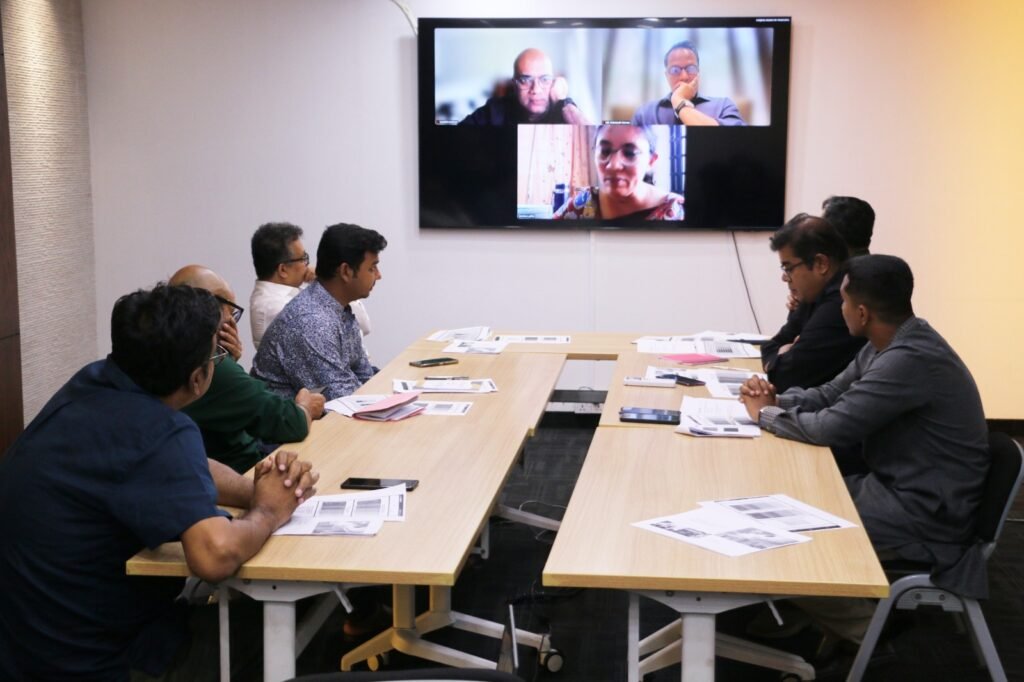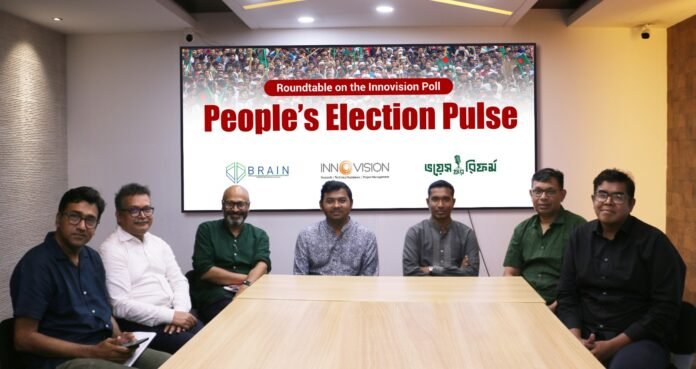আজ ১৫ মার্চ ২০২৫ শনিবার সকাল ১১টায় বাংলাদেশ রিসার্চ এনালাইসিস এন্ড ইনফরমেশন নেটওয়ার্ক (ব্রেইন), ইনোভিশন এবং ভয়েস অফ রিফর্মসের যৌথ উদ্যোগে ইনোভিশনের জরিপের ভিত্তিতে People’s Election Pulse: February-March, 2025 শীর্ষক একটি গোলটেবিল আলোচনা অনুষ্ঠিত হয়েছে।
ইনোভিশন বাংলাদেশ নামে একটি গবেষণা সংস্থার উদ্যোগে দেশের ৬৪ জেলার ১০ হাজার ৬৯০ জনকে নিয়ে সম্প্রতি একটি জরিপের ফলাফল প্রকাশিত হয়েছে। বর্তমান প্রেক্ষাপটে জনগণের নির্বাচনী দৃষ্টিভঙ্গি, তারা কবে নির্বাচন চান, বর্তমান ও ভবিষ্যৎ সরকারের কাছে তাদের প্রত্যাশা, তারা কাকে ভোট দিতে চান এবং ভোট দেওয়ার ক্ষেত্রে কোন কোন বিষগুলোকে তারা গুরুত্ব দেন – এসব বিভিন্ন বিষয়ের ওপর জরিপটি পরিচালিত হয়েছিল।
এই গোলটেবিল আলোচনাতে অংশ নিয়েছেন ইনোভিশনের ব্যবস্থাপক পরিচালক মো. রোবায়েত সারোয়ার, অর্থনীতিবিদ ও রাজনৈতিক বিশ্লেষক জ্যোতি রহমান, ভয়েস অফ রিফর্মের আহ্বায়ক ফাহিম মাসরুর, লেখক ও এনসিপির যুগ্ম আহ্বায়ক সারোয়ার তুষার, ঢাকা বিশ্ববিদ্যালয়ের শিক্ষক সামিনা লুৎফা, রাজনৈতিক বিশ্লেষক সাইদ আব্দুল্লাহ, ব্র্যাকের শিক্ষক ইমরান মতিন ও অর্থনীতিবিদ অনন্য রায়হান।
মো. রোবায়েত সারোয়ার জরিপ পরিচালনার পদ্ধতিগত দিক এবং জরিপের ফলাফল তুলে ধরেন। জরিপে দেখা যায়, জরিপে অংশ নেওয়া ব্যক্তিদের প্রধান উদ্বেগ অর্থনৈতিক সংকট। অন্তর্বর্তী সরকারের কাছে তারা যে প্রত্যাশা রাখেন, তার মধ্যে মূল্যস্ফীতি নিয়ন্ত্রণকে সর্বোচ্চ ৬৯ দশমিক ৬ শতাংশ অংশগ্রহণকারী অগ্রাধিকার দিয়েছেন। এছাড়া আইন-শৃঙ্খলা পরিস্থিতির উন্নয়ন (৪৫ দশমিক ২ শতাংশ) এবং কর্মসংস্থান বৃদ্ধি (২৯ দশমিক ১ শতাংশ) ছিল অন্যান্য গুরুত্বপূর্ণ চাহিদা। সরকারি সেবায় দুর্নীতি কমানোর প্রত্যাশা করেছেন ২১ দশমিক ৮ শতাংশ অংশগ্রহণকারী। জরিপের অংশ নেওয়া ৫৮ দশমিক ১৭ শতাংশ ভোটার ২০২৫ সালের মধ্যেই নির্বাচন চান।
জরিপ অনুযায়ী, যারা ভোট দেওয়ার কথা বলেছেন, তাদের ৪১.৭% বলেছেন বিএনপিকে ভোট দিবে, ৩১.৬% রায় দিয়েছেন জামায়াতে ইসলামীর পক্ষে; ১৩.৯% আওয়ামীলীগ এবং ৫.১% শিক্ষার্থীদের নতুন দলকে।
জরিপ অনুযায়ী, ২৯ দশমিক ৪ শতাংশ ভোটার এখনো সিদ্ধান্ত নেননি যে তারা কাকে ভোট দেবেন। তাদের মধ্যে ৪৯ দশমিক ৩ শতাংশ বলছেন যে তারা প্রার্থী সম্পর্কে জানার পর সিদ্ধান্ত নেবেন। আর ৩৩ দশমিক ৯ শতাংশ ভোটার রাজনৈতিক পরিস্থিতি দেখে সিদ্ধান্ত নিতে চান। এক্ষেত্রে নারী ভোটারদের মধ্যে অনিশ্চয়তা বেশি (৩৩ দশমিক ৭৭ শতাংশ)। পুরুষদের ক্ষেত্রে এই হার ২৫ দশমিক ৮১ শতাংশ।
নির্বাচনী জরিপের ফলাফল দেখায় যে তরুণ ভোটার, ধর্মীয় ও জাতিগত সংখ্যালঘু ভোটার, নারী ভোটার, সরকারি কর্মকর্তা ও শিক্ষার্থীরা অনিশ্চিত ভোটারদের বৃহৎ অংশ গঠন করে। তরুণ ভোটারদের মধ্যে প্রায় এক-তৃতীয়াংশ জানিয়েছে যে তারা নির্বাচন বা মূলধারার রাজনৈতিক দলগুলোর প্রতি আগ্রহী নয়। শহরের ভোটারদের মধ্যে প্রতি পাঁচজনের একজন একই কথা বলেছেন। আনডিসাইডেড ভোটারদের মধ্যে জেনজিদের সংখ্যাই বেশি।

মো. রোবায়েত সারোয়ার বলেন, ‘রাজনৈতিক দলগুলোর জন্য তরুণ ভোটার এবং শহরের ভোটারদের আস্থা অর্জনের জন্য তাদের সঙ্গে গভীর সম্পর্ক স্থাপন করা জরুরি।’
তিনি আরও বলেন, ‘আওয়ামী লীগের পতনের ফলে একটি বড় অংশের ভোটার এখন ভাসমান অবস্থায় রয়েছে। এদের মধ্যে গ্রামীণ এলাকায় এবং বয়স্ক ভোটার বেশি। তাদের ভোটে আগ্রহী করতে হলে তাদের চাহিদা ও উদ্বেগগুলোর মূল্যায়ন করা অত্যন্ত গুরুত্বপূর্ণ।’
তিনি আশংকা প্রকাশ করেন, বর্তমান রাজনৈতিক পরিস্থিতিতে, উল্লেখযোগ্যসংখ্যক ভোটার শেষ পর্যন্ত ভোট না-ও দিতে পারে।
সামাজিক যোগাযোগ মাধ্যম তথ্যের অন্যতম প্রধান উৎস হয়ে উঠছে। জরিপে দেখা যায়, রাজনীতি, অর্থনীতি, সরকারের কাজ, আইনশৃঙ্খলা পরিস্থিতি বিষয়ে সামাজিক যোগাযোগ মাধ্যম দ্বারা প্রভাবিত হন। কিন্তু সাধারণত ভোটের ক্ষেত্রে পরিবার বা পারিবারিক পছন্দই প্রাধান্য পেয়ে থাকে।
নারী ভোটারদের নিয়ে রোবায়েত সারোয়ার বলেন, ‘নারী ভোটাররা রাজনীতি ও নির্বাচনের প্রতি তুলনামূলকভাবে বেশি উদাসীন এবং তারা ভোট নাও দিতে পারে। নারী ভোটারদের আস্থা অর্জন করা নির্বাচনের ফলাফলে বড় পরিবর্তন আনতে পারে।’
সামাজিক যোগাযোগমাধ্যম তরুণদের মধ্যে জনপ্রিয় হয়ে উঠলেও বেসরকারি টিভি চ্যানেলকেই বিশ্বস্থ বলে মনে করেন অধিকাংশ। রোবায়েত সারোয়ার বলেন, ‘সামাজিক যোগাযোগমাধ্যম এবং বেসরকারি টিভি চ্যানেলের সংবাদ পরিবেশনাই তরুণ ভোটারদের দলীয় পছন্দ পরিবর্তন করতে পারে।’
জরিপ থেকে সোশ্যাল মিডিয়া ইনফুয়েলন্সারদের প্রভাবও উঠে এসেছে। তারা আসন্ন নির্বাচনে গুরুত্বপূর্ন ভূমিকা পালন করতে পারে বলে মনে করা হচ্ছে।
অর্থনীতিবিদ জ্যোতি রহমান বাংলাদেশের নির্বাচনের ইতিহাসের পরিপ্রেক্ষিতে ইনোভিশনের জরিপকে পর্যালোচনা করেন। তিনি বলেন, এই জরিপের ফলাফলে একদিকে জামায়াতের ইসলামীর উত্থান দেখা যাচ্ছে, অন্যদিকে ইতিহাসে দ্বিতীয়বারের মতো কলাপস করেছে আওয়ামীলীগ। বিএনপির অবস্থান স্থিতিশীল। এইবার প্রশ্ন হবে এনসিপি কী করে সেটা দেখা? তিনি বলেন, এবার দেখতে হবে, এই অনিশ্চিত ও অপ্রকাশিত ভোটারদের কারা দলে টানতে পারে?
রাজনৈতিক বিশ্লেষক সাইদ আবদুল্লাহ বলেন, এই জরিপের স্যামপ্লিং ও পদ্ধতি খুব ভালো ছিল। তিনি বলেন, জেনজি প্রজন্ম খুব দ্রুত সিদ্ধান্ত বদলায়। তারা যেমন দ্রুত কাউকে নায়ক বানায়, তেমনি দ্রুত ভিলেন বানায়। এখানে দলের চেয়ে ব্যক্তিই বেশি গুরুত্বপূর্ণ হয়ে উঠবে।
লেখক ও এনসিপির যুগ্ম আহ্বায়ক সারোয়ার তুষার বলেন, এই জরিপের ভিত্তিতে কোনো চূড়ান্ত সিদ্ধান্তে পৌঁছানো যাবে না, কিন্তু প্রবণতা সম্পর্কে ধারণা পাওয়া যাচ্ছে। জরিপ যখন হচ্ছে, তখনো দল হিসাবে এনসিপি আসেনি। তারা কেবল জানতো যে, শিক্ষার্থীদের নেতৃত্বে একটি দল আসতে পারে, কিন্তু সেটা স্পষ্ট না। এখন জরিপ হলে ফলাফল ভিন্নও হতে পারে।
তিনি বলেন, এখনকার ভোটাররা অনেক বেশি ইনফর্মড। তারা প্রার্থী দেখতে চাইবে, কর্মসূচি দেখতে চাইবে।
ঢাকা বিশ্ববিদ্যালয়ের শিক্ষক সামিনা লুৎফা বলেন, জরিপে দেখা যাচ্ছে নারী ও প্রান্তিক গোষ্ঠীগুলো অনিশ্চিত ভোটারদের ক্ষেত্রে অনেক বড় ফ্যক্টর। রাজনৈতিক দলগুলোর জন্য এটা খুব গুরুত্বপূর্ণ।
তিনি আরও বলেন, অন্তর্বর্তীকালীন সরকার যত সফল হবে, আইনশৃঙ্খলা পরিস্থিতি যত উন্নতি হবে, সেটা নতুন দল হিসাবে এনসিপির জন্য ভালো হবে। পাশাপাশি, আইনশৃঙ্খলা পরিস্থিতি ঠিক না হলে, সকল রাজনৈতিক দলগুলর জন্যই এটা হুমকিস্বরূপ হয়ে উঠবে।
অর্থনীতিবিদ অনন্য রায়হান বলেন, তরুণদের একটা দল গঠিত হয়েছে। এরকম প্রেক্ষাপট আগে ছিল না। এই জরিপ থেকে চূড়ান্ত কোনো সিদ্ধান্ত নেওয়ার সময় এখনো আসেনি।
ব্র্যাকের শিক্ষক ইমরান মতিন বলেন, নির্বাচনের পূর্বে সবসময় একটি তৃতীয় বিকল্পের চাহিদা থাকতো। এইবার প্রথমবার সেই সম্ভাবনা তৈরি হয়েছে। কিন্তু এই বিকল্প কতটা জেনুইন হবে, সেটা হবে মূল ফ্যাক্টর।
ভয়েস অফ রিফর্মের আহ্বায়ক ফাহিম মাসরুর বলেন, জরিপে দেখা যাচ্ছে কৃষক, ব্যবসায়ী ও গৃহিনীদের মধ্যে বিএনপি এগিয়ে আছে। অন্যদিকে পেশাজীবীদের মধ্যে জামায়াতে ইসলামি এগিয়ে আছে। পেশাজীবীদের মধ্যে জামায়াতের এগিয়ে থাকার নানাবিধ প্রভাব পড়তে পারে নির্বাচনে।
তিনি আরো বলেন, এই জরিপ যখন শুরু হয়েছিল তখন অধিকাংশ উত্তর দিয়েছিল, এই সরকারের দুই তিন বছর থাকা উচিৎ, অন্যদিকে এখন অধিকাংশ বলছেন নির্বাচন ডিসেম্বরের মধ্যেই হলে ভালো।
তিনি আরও বলেন, এনসিপি সম্পর্কিত দৃষ্টিভঙ্গি সরকারের পারফরম্যান্সের ওপর জড়িয়ে পড়েছে।
অনুষ্ঠানটি সঞ্চালনা করেন ব্রেইনের প্রধান সমন্বয়ক সফিকুর রহমান।
On Saturday, March 15, 2025, at 11:00 AM, a roundtable discussion titled People’s Election Pulse: February-March 2025 was held, jointly organized by Bangladesh Research Analysis and Information Network (BRAIN), Innovision, and Voice of Reforms. The discussion was based on a recent survey conducted by Innovision Bangladesh, which involved 10,690 respondents from all 64 districts of the country. The survey explored public perspectives on elections, their preferred election timeline, expectations from the current and future governments, voting preferences, and key factors influencing their electoral decisions.
The roundtable featured several notable participants, including Innovision’s Managing Director Md. Robayet Sarwar, economist and political analyst Jyoti Rahman, Voice of Reforms convener Fahim Mashroor, writer and NCP’s joint convener Sarwar Tusher, Dhaka University professor Samina Luthfa, political analyst Said Abdullah, BRAC professor Imran Matin, and economist Anannya Raihan. Md. Robayet Sarwar presented the methodology and findings of the survey, which revealed that the primary concern among respondents was the economic crisis. Controlling inflation was identified as the top priority for an interim government by 69.6% of respondents, followed by improving law and order (45.2%) and increasing employment opportunities (29.1%). Additionally, 21.8% of respondents expressed the need for reducing corruption in government services. The survey found that 58.17% of respondents preferred elections to be held within 2025.
In terms of voting preferences, 41.7% of respondents indicated support for the BNP, 31.6% favored Jamaat-e-Islami, 13.9% supported the Awami League, and 5.1% expressed support for the new student-led party. However, 29.4% of voters remained undecided, with 49.3% of them stating they would decide after learning more about the candidates, while 33.9% preferred to wait and assess the political situation before making a decision. Notably, uncertainty was higher among female voters (33.77%) compared to male voters (25.81%). The survey highlighted that undecided voters were predominantly young, religious and ethnic minorities, women, government employees, and students. Around one-third of young voters expressed disinterest in elections and mainstream political parties, while one in five urban voters shared a similar sentiment.
Md. Robayet Sarwar emphasized the need for political parties to engage deeply with young and urban voters to gain their trust. He noted that with the fall of the Awami League, a significant portion of voters were now in a floating position, particularly in rural areas and among older demographics. Addressing their concerns and priorities would be crucial in mobilizing their votes. However, he also expressed concerns that a significant number of voters might ultimately choose not to participate in the elections.
The survey found that social media had become a major source of political, economic, and governance-related information, but family influence remained the primary determinant in voting decisions. Robayet Sarwar pointed out that female voters exhibited greater political apathy and might abstain from voting altogether, making their engagement a critical factor in election outcomes. While social media played a dominant role among young voters, most respondents still considered private television channels to be the most trustworthy source of information. He noted that media coverage, particularly on social media and private TV channels, could significantly influence young voters’ political preferences. Additionally, social media influencers were emerging as key opinion leaders, with the potential to impact election outcomes.
Economist Jyoti Rahman analyzed the survey in the context of Bangladesh’s electoral history. He observed that the results indicated a rise in support for Jamaat-e-Islami and a significant collapse of the Awami League for the second time in history, while BNP’s position remained stable. The critical question now was how the NCP would navigate this shifting political landscape. He suggested that much would depend on which political force could successfully attract the undecided and uncommitted voters.
Political analyst Said Abdullah praised the survey’s sampling and methodology, emphasizing that Generation Z voters were highly volatile in their decision-making. He noted that young voters could quickly elevate a candidate to a hero status but could just as swiftly turn against them, suggesting that individual candidates, rather than political parties, would play a more significant role in shaping electoral outcomes.
Writer and NCP joint convener Sarwar Tusher cautioned against drawing definitive conclusions from the survey but acknowledged that it provided valuable insights into emerging trends. He pointed out that when the survey was conducted, the NCP had not yet formally emerged as a political entity. Voters were aware of the possibility of a student-led party but did not have a clear understanding of its structure. If the survey were conducted now, the results might differ significantly. He emphasized that today’s voters were well-informed and would carefully assess candidates and their programs before making decisions.
Dhaka University professor Samina Luthfa highlighted that women and marginalized groups constituted a significant portion of undecided voters, making their engagement crucial for political parties. She suggested that the performance of the interim government, particularly in maintaining law and order, would influence the NCP’s prospects. If the law and order situation remained stable, it would benefit the new party. However, if instability persisted, it would pose challenges for all political parties.
Economist Anannya Raihan noted that the emergence of a youth-led political party was unprecedented in Bangladesh’s political history. He cautioned against making final judgments based on the survey results, emphasizing that the political landscape was still evolving.
BRAC professor Imran Matin observed that there had always been a demand for a third political alternative before elections. However, for the first time, such an alternative had materialized. The key question now was whether this alternative would be perceived as a genuine and credible option.
Voice of Reforms convener Fahim Mashroor pointed out that the survey indicated BNP’s stronghold among farmers, businesspeople, and housewives, while Jamaat-e-Islami had gained support among professionals. He noted that Jamaat’s rising popularity among professionals could have significant electoral implications. He also observed that when the survey began, many respondents believed the government should remain in power for two to three more years. However, by the end of the survey, most respondents preferred elections to be held by December 2025. He further stated that perceptions of the NCP were closely linked to the performance of the interim government.
The discussion was moderated by BRAIN’s chief coordinator, Shafiqur Rahman.
অনুষ্ঠানের লিঙ্ক : ফেসবুক লাইভ
গণমাধ্যম
প্রথম আলো : বিরোধী দলই আসলে রাজনৈতিক দলের ‘ক্যারেক্টার’ তৈরি করে: সারোয়ার তুষার, ১৫ মার্চ ২০২৫
ডেইলি স্টার : Interim government’s performance key to voter turnout in polls, Mar 16, 2025
যুগান্তর : ‘জামায়াত থেকে নাগরিক পার্টির ভোট বেশি হবে’, ১৫ মার্চ ২০২৫
দি বিজনেস স্ট্যান্ডার্ড : এনসিপির জন্য বিরোধী দল হওয়াটাই ভালো: সারোয়ার তুষার, ১৫ মার্চ ২০২৫
ইটিভি : জাতীয় নির্বাচনের ফলাফল নির্ভর করবে তরুণ ও সুইং ভোটারদের ওপর | ETV NEWS | Ekushey TV,১৫ মার্চ ২০২৫

